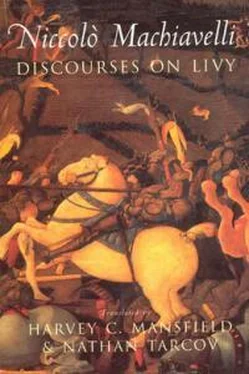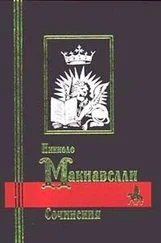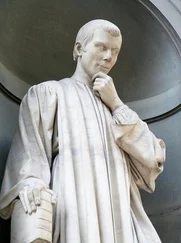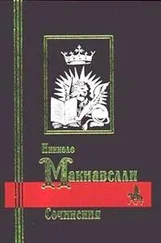Николо Макиавелли - Discourses on Livy
Здесь есть возможность читать онлайн «Николо Макиавелли - Discourses on Livy» весь текст электронной книги совершенно бесплатно (целиком полную версию без сокращений). В некоторых случаях можно слушать аудио, скачать через торрент в формате fb2 и присутствует краткое содержание. Год выпуска: 2014, Издательство: epubBooks Classics, Жанр: История, Философия, на английском языке. Описание произведения, (предисловие) а так же отзывы посетителей доступны на портале библиотеки ЛибКат.
- Название:Discourses on Livy
- Автор:
- Издательство:epubBooks Classics
- Жанр:
- Год:2014
- ISBN:нет данных
- Рейтинг книги:5 / 5. Голосов: 1
-
Избранное:Добавить в избранное
- Отзывы:
-
Ваша оценка:
- 100
- 1
- 2
- 3
- 4
- 5
Discourses on Livy: краткое содержание, описание и аннотация
Предлагаем к чтению аннотацию, описание, краткое содержание или предисловие (зависит от того, что написал сам автор книги «Discourses on Livy»). Если вы не нашли необходимую информацию о книге — напишите в комментариях, мы постараемся отыскать её.
Discourses on Livy — читать онлайн бесплатно полную книгу (весь текст) целиком
Ниже представлен текст книги, разбитый по страницам. Система сохранения места последней прочитанной страницы, позволяет с удобством читать онлайн бесплатно книгу «Discourses on Livy», без необходимости каждый раз заново искать на чём Вы остановились. Поставьте закладку, и сможете в любой момент перейти на страницу, на которой закончили чтение.
Интервал:
Закладка:
It then only remained to assign its place to the popular element, and the Roman nobles growing insolent from causes which shall be noticed hereafter, the commons against them, when, not to lose the whole of their power, they were forced to concede a share to the people; while with the share which remained, the senate and consuls retained so much authority that they still held their own place in the republic. In this way the tribunes of the people came to be created, after whose creation the stability of the State was much augmented, since each the three forms of government had now its due influence allowed it. And such was the good fortune of Rome that although her government passed from the kings to the nobles, and from these to the people, by the steps and for the reasons noticed above, still the entire authority of the kingly element was not sacrificed to strengthen the authority of the nobles, nor were the nobles divested of their authority to bestow it on the commons; but three, blending together, made up a perfect State; which perfection, as shall be fully shown in the next two Chapters, was reached through the dissensions of the commons and the senate.
Chapter III
Of the Accidents Which Led in Rome to the Creation of Tribunes of the People; Whereby the Republic Was Made More Perfect
They who lay the foundations of a State and furnish it with laws must, as is shown by all who have treated of civil government, and by examples of which history is full, assume that 'all men are bad, and will always, when they have free field, give loose to their evil inclinations; and that if these for a while remain hidden, it is owing to some secret cause, which, from our having no contrary experience, we do not recognize at once, but which is afterwards revealed by Time, of whom we speak as the father of all truth.
In Rome, after the expulsion of the Tarquins, it seemed as though the closest union prevailed between the senate and the commons, and that the nobles, laying aside their natural arrogance, had learned so to sympathize with the people as to have become supportable by all, even of the humblest rank. This dissimulation remained undetected, and its causes concealed, while the Tarquins lived; for the nobles dreading the Tarquins, and fearing that the people, if they used them ill, might take part against them, treated them with kindness. But no sooner were the Tarquins got rid of, and the nobles thus relieved of their fears, when they began to spit forth against the commons all the venom which before they had kept in their breasts, offending and insulting them in every way they could; confirming what I have observed already, that men never behave well unless compelled, and that whenever they are free to act as they please, and are under no restraint everything falls at once into confusion and disorder. Wherefore it has been said that as poverty and hunger are needed to make men industrious, so laws are needed to make them good. When we do well without laws, laws are not needed; but when good customs are absent, laws are at once required.
On the extinction of the Tarquins, therefore, the dread of whom had kept the nobles in check, some new safeguard had to be contrived, which should effect the same result as had been effected by the Tarquins while they lived. Accordingly, after much uproar and confusion, and much danger of violence ensuing between the commons and the nobles, to insure the safety of the former, tribunes were created, and were invested with such station and authority as always afterwards enabled them to stand between the people and the senate, and to resist the insolence of the nobles.
Chapter IV
That the Dissensions Between the Senate and Commons of Rome, Made Rome Free and Powerful
Touching those tumults which prevailed in Rome from the extinction of the Tarquins to the creation of the tribunes the discussion of which I have no wish to avoid, and as to certain other matters of a like nature, I desire to say something in opposition to the opinion of many who assert that Rome was a turbulent city, and had fallen into utter disorder, that had not her good fortune and military prowess made amends for other defects, she would have been inferior to every other republic.
I cannot indeed deny that the good fortune and the armies of Rome were the causes of her empire; yet it certainly seems to me that those holding this opinion fail to perceive, that in a State where there are good soldiers there must be good order, and, generally speaking, good fortune. And looking to the other circumstances of this city, I affirm that those who condemn these dissensions between the nobles and the commons, condemn what was the prime cause of Rome becoming free; and give more heed to the tumult and uproar wherewith these dissensions were attended, than to the good results which followed from them; not reflecting that while in every republic there are two conflicting factions, that of the people and that of the nobles, it is in this conflict that all laws favourable to freedom have their origin, as may readily be seen to have been the case in Rome. For from the time of the Tarquins to that of the Gracchi, a period of over three hundred years, the tumults in Rome seldom gave occasion to punishment by exile, and very seldom to bloodshed. So that we cannot truly declare those tumults to have been disastrous, or that republic to have been disorderly, which during all that time, on account of her internal broils, banished no more than eight or ten of her citizens, put very few to death, and rarely inflicted money penalties. Nor can we reasonably pronounce that city ill–governed wherein we find so many instances of virtue; for virtuous actions have their origin in right training, right training in wise laws, and wise laws in these very tumults which many would thoughtlessly condemn. For he who looks well to the results of these tumults will find that they did not lead to banishments, nor to violence hurtful to the common good, but to laws and ordinances beneficial to the public liberty. And should any object that the behaviour of the Romans was extravagant and outrageous; that for the assembled people to be heard shouting against the senate, the senate against the people; for the whole commons to be seen rushing wildly through the streets, closing their shops, and quitting the town, were things which might well affright him even who only reads of them; it may be answered, that the inhabitants of all cities, more especially of cities which seek to make use of the people in matters of importance, have their own ways of giving expression to their wishes; among which the city of Rome had the custom, that when its people sought to have a law passed they followed one or another of those courses mentioned above, or else refused to be enrolled as soldiers when, to pacify them, something of their demands had to be conceded. But the demands of a free people are hurtful to freedom, since they originate either in being oppressed, or in the fear that they are about to be so. When this fear is groundless, it finds its remedy in public meetings, wherein some worthy person may come forward and show the people by argument that they are deceiving themselves. For though they be ignorant, the people are not therefore, as Cicero says, incapable of being taught the truth, but are readily convinced when it is told them by one in whose honesty they can trust.
We should, therefore, be careful how we censure the government of Rome, and should reflect that all the great results effected by that republic, could not have come about without good cause. And if the popular tumults led the creation of the tribunes, they merit all praise; since these magistrates not only gave its due influence to the popular voice in the government, but also acted as the guardians of Roman freedom, as shall be clearly shown in the following Chapter.
Читать дальшеИнтервал:
Закладка:
Похожие книги на «Discourses on Livy»
Представляем Вашему вниманию похожие книги на «Discourses on Livy» списком для выбора. Мы отобрали схожую по названию и смыслу литературу в надежде предоставить читателям больше вариантов отыскать новые, интересные, ещё непрочитанные произведения.
Обсуждение, отзывы о книге «Discourses on Livy» и просто собственные мнения читателей. Оставьте ваши комментарии, напишите, что Вы думаете о произведении, его смысле или главных героях. Укажите что конкретно понравилось, а что нет, и почему Вы так считаете.











